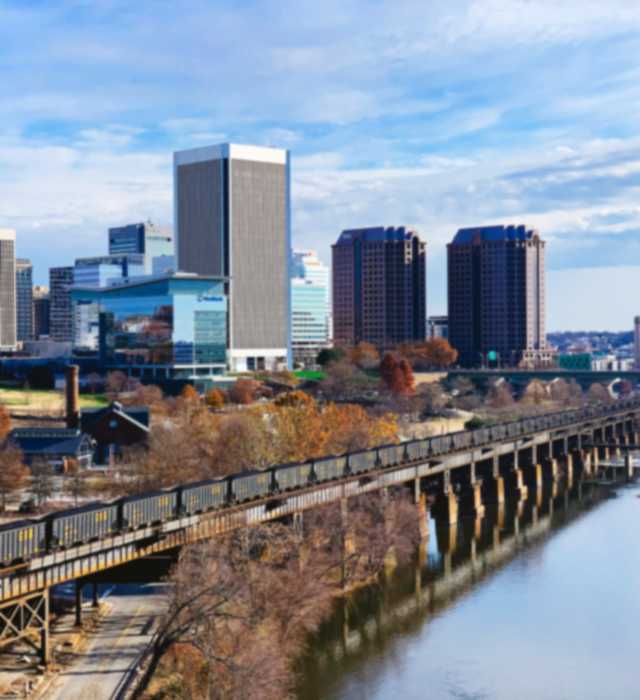Richmond Region Tourism team members Pamela Ellis Benson, CTA and Lauran Peoples, CSEP, CGMP have been safely attending in-person events since earlier this year. The two M&C professionals share their experiences, along with the importance of leading with empathy in client relationships, in our latest Meeting Moments Q&A.
Can you introduce yourselves and describe your roles?
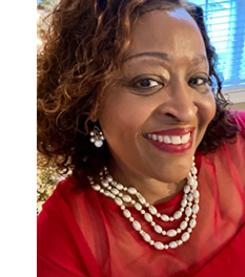 Pamela Ellis Benson, CTA: I am a graduate of Tennessee State University, and a 47-year veteran in the hospitality industry. Over the years I have accumulated a variety of expertise and experience from several tourism segments including airline, hotel and convention bureau sales.
Pamela Ellis Benson, CTA: I am a graduate of Tennessee State University, and a 47-year veteran in the hospitality industry. Over the years I have accumulated a variety of expertise and experience from several tourism segments including airline, hotel and convention bureau sales.
Currently, as a National Destination Sales Manager (NDSM), I focus on city-wide and convention center business. It is a pleasure to share the unique qualities of the Richmond region while assisting planners and working towards meeting their overall event goals. I am grateful to have garnered many rewarding relationships throughout this journey near and far.
I am looking forward to what the future will offer us all in tourism.
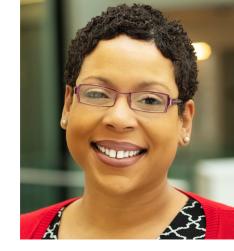 Lauran Peoples, CSEP, CGMP: It’s true that time flies when you’re having fun (and love what you do)!
Lauran Peoples, CSEP, CGMP: It’s true that time flies when you’re having fun (and love what you do)!
I’ve been in the hospitality industry for almost 20 years and working in destination marketing for the past six years. As a Destination Sales Manager (DCSM), my job is to present the region as a smart meeting and convention destination to conference planners across the country. Specifically, I focus on single-property groups, which are meetings and conventions that can be housed at one hotel. While I’ve always enjoyed working one on one with our hotel partners, post-pandemic, I have the opportunity to work even more closely with our partners to identify and pursue opportunities that align with their recovery strategies and periods of increased need.
How do your roles intersect?
Pamela: As we build partnerships for long-term relationships with clients, my position intersects in a very organic manner with the DCSM role. The number of guestrooms requested on peak nights and amount of Convention Center space required is the separation factor. We are constantly priming and cultivating business for each other using this format. Our market responsibilities are similar; however, our goal is the same, which is to identify new opportunities, build relationships and book meetings and convention business in our city.
For instance, I recently received an opportunity to host a meeting requiring 900 peak guestrooms and 75,000 sq. ft. of meeting space. A perfect city-wide scenario for downtown Richmond! The same client later requested a future proposal for a meeting requiring 300 peak guestrooms with limited meeting space requirements. I was delighted to introduce her to our DCSM to search out hotels within the region that would best accommodate those needs. I continued to focus on the city-wide effort, resulting in the client’s ability to have access to two professionals within our organization to consult for her meeting needs. Within our market similarities we work together to render the best outcomes for us and our client.
You recently attended two meetings-focused conferences this year, can you describe what the experiences were like?
Lauran: To say that both meetings were a welcomed return to meeting face-to-face would be an understatement. They were fantastic, and both felt like reunions!
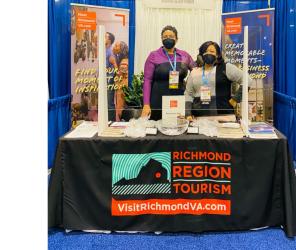 After being away for over a year, Pamela and I made our return debut on the tradeshow floor at the Religious Conference Management Association in Charlotte, NC. It was in March, and while it was obvious that we were ready to get back to business, there was still an extremely heightened sense of vigilance with safety protocols to make sure that we were all safe. Each day, we completed a daily health screening assessment before we were allowed to enter the convention center and required to wear masks throughout our time there.
After being away for over a year, Pamela and I made our return debut on the tradeshow floor at the Religious Conference Management Association in Charlotte, NC. It was in March, and while it was obvious that we were ready to get back to business, there was still an extremely heightened sense of vigilance with safety protocols to make sure that we were all safe. Each day, we completed a daily health screening assessment before we were allowed to enter the convention center and required to wear masks throughout our time there.
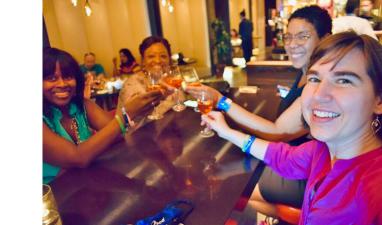 Our next in-person tradeshow was Connect Las Vegas, and in two short months the overall feel and environment had transformed to mirror the progress steps that society was experiencing as a whole. By this time, vaccinations had increased, and we were able to move around a little more freely, and confidently.
Our next in-person tradeshow was Connect Las Vegas, and in two short months the overall feel and environment had transformed to mirror the progress steps that society was experiencing as a whole. By this time, vaccinations had increased, and we were able to move around a little more freely, and confidently.
There was also a noted shift in conversations that we were starting to have with planners. We were still relishing the reality of seeing actual smiles and sharing real hugs again, but during our appointments we were also beginning the very real conversations of thoughtfully and cautiously moving forward.
What trends are you seeing within Faith and Fraternal sectors when it comes to planning meetings?
Pamela: At this time, clearly people are ready to move back into the face-to-face space. Faith and Fraternal is certainly no different. Across the country faith leaders are slowly starting to move back into sanctuaries with caution, and destination decisions for large meetings seem to be forecasted for late this year to early first quarter. On the other hand, smaller meetings are currently in progress and meeting safely. It seems meetings and conferences may look a little different in regard to format for most groups going forward. The hybrid/virtual platform has seemingly worked during this transition and as a result seems to be a consideration as a future meeting possibility for many.
As you help clients plan for the future, how do you incorporate empathy within your partnerships?
Lauran: By leading with respect for wherever they happen to be in their planning process. Each market is rebounding a little differently. Exercising empathy and consideration for the specific challenges around the recovery that exist within the Faith, Fraternal and Multicultural markets is paramount to maintaining relationships with our clients.
Also, understanding that our clients are people first who, just like us, had their lives upended by a global pandemic. Some of their lives were irreversibly altered, and if our partnership is just one small thing that feels remotely familiar, then we have a responsibility, and are humbled by the opportunity, to honor our clients first as people that we care about, and who we are genuinely happy to reconnect with. That is the ultimate privilege.
Richmond Region Tourism recently launched a program called Meaningful Meetings. Can you describe how the initiative will reignite the economy and identify new business opportunities for the region?
Pamela: Virginia was recently named by CNBC as the “top state for business.” This designation certainly indicates that our state is in the limelight for new and expanding business opportunities in the near future which will definitely enhance the landscape for many sectors of business throughout the area. Tourism will be one of the sectors to benefit from this potential future economic boost.
Meaningful Meetings is a program designed to utilize resources from various business sectors within the Richmond region. We will align ourselves with some of the brightest minds in the community to attract and secure M&C business from their perspective sectors. Once the introductions are confirmed Richmond Region Tourism will transition as the city ambassador throughout the process. This economically developed plan will stimulate the economy and offer strategies that activate the power of business events with the goal of driving economic recovery.
